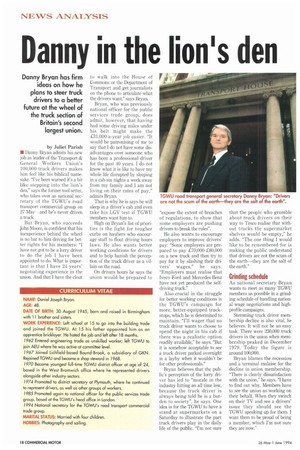Danny in the lion's den
Page 20

If you've noticed an error in this article please click here to report it so we can fix it.
Danny Bryan has firm ideas on how he plans to steer truck drivers to a better future at the wheel of the truck section of Britain's second largest union.
by Juliet Parish • Danny Bryan admits his new job as leader of the Transport & General Workers Union's 100,000 truck drivers makes him feel like his biblical namesake, "I've been warned it's a bit like stepping into the lion's den," says the former tool setter, who takes over as national secretary of the TGWU's road transport commercial group on 27 May—and he's never driven a truck.
But Bryan, who succeeds John Moore, is confident that his inexperience behind the wheel is no bar to him driving for better rights for his members: "I have not got to be a lorry driver to do the job I have been appointed to do. What is important is that I have 24 years' negotiating experience in the union. And that I have the clout to walk into the House of
Commons or the Depai iment of Transport and get journalists on the phone to articulate what the drivers want," says Bryan.
Bryan, who was previously national officer for the public services trade group, does admit, however, that having had some driving miles under his belt might make the X31,000-a-year job easier. "It would be patronising of me to say that I do not have some disadvantages over someone who has been a professional driver for the past 40 years. I do not know what it is like to have my whole life disrupted by sleeping in a cab six nights a week away from my family and I am not living on their rates of pay," admits Bryan.
That is why he is says he will sleep in a driver's cab and even take his LGV test if TGWU members want him to.
High on Bryan's list of priorities is the fight for tougher curbs on hauliers who encourage staff to flout driving hours laws. He also wants better working conditions for drivers and to help banish the perception of the truck driver as a villain on the road.
On drivers hours he says the union would be prepared to "expose the extent of breaches of regulations, to show that some employers are pushing drivers to break the rules".
He also wants to encourage employers to improve drivers' pay: "Some employers are prepared to pay .00,000-X80,000 on a new truck and then try to pay for it by slashing their drivers' wages," he says. "Employers must realise that lveco Ford and Mercedes-Benz have not yet produced the selfdriving truck."
Also crucial in the struggle for better working conditions is the TGWU's campaign for more, better-equipped truckstops, which he is determined to maintain. "I'll wager that no truck driver wants to choose to spend the night in his cab if there was a realistic option readily available," he says. "But it is somehow acceptable to see a truck driver parked overnight in a layby when it wouldn't be for other professionals."
Bryan believes that the public's perception of the lorry driver has led to "morale in the industry hitting an all time low, because the truck driver is always being told he is a burden to society", he says. One idea is for the TGWU to have a stand at supermarkets on a Saturday to illustrate the part truck drivers play in the daily life of the public. "I'm not sure that the people who grumble about truck drivers on their way to Tesco realise that without trucks the supermarket shelves would be empty," he adds. 'The one thing I would like to be remembered for is making the public understand that drivers are not the scum of the earth—they are the salt of the earth."
Grinding schedule
As national secretary Bryan wants to meet as many TGWU members as possible in a grinding schedule of handling national wage negotiations and highprofile campaigns.
Stemming truck driver membership decline is also vital, he believes. It will not be an easy task. There were 230,000 truck drivers in the union when membership peaked in December 1979. Today the figure is around 100,000.
Bryan blames the recession and a terminal malaise for the decline in union membership. "There is clearly dissatisfaction with the union," he says. "I have to find out why. Members have to see the union as working on their behalf. When they switch on their TV and see a drivers' issue they should see the TGWU speaking up for them. I want them to be proud of being a member, which I'm not sure they are now,"
























































































